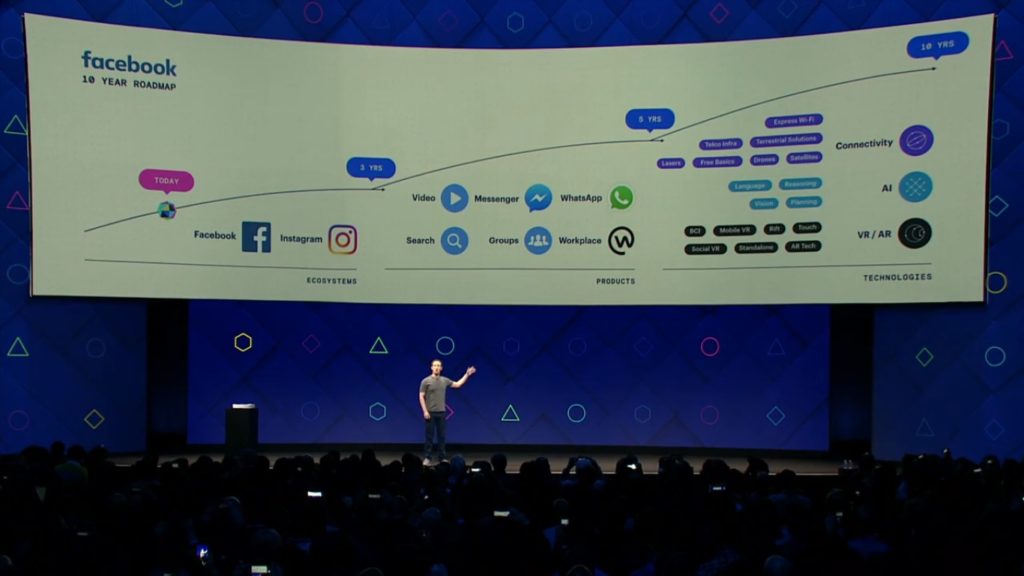Earlier at F8, Facebook’s annual developer summit, Mark Zuckerberg announced a handful of features in a bid to strengthen Facebook’s efforts towards Augmented Reality. The irony of a new Fast & Furious movie (also nicknamed F8) coming out a few days before F8 was not lost on Zuckerberg who proceed to make light of the situation by cracking three jokes around it (although admittedly, at least may have fallen flat).
Starting today, Facebook is opening up a camera effects platform for developers in a move which Zuckerberg calls Act 2. Thus, instead of being limited to a handful of AR stickers and filters created by Facebook itself, Facebook is effectively crowd-sourcing its efforts at beating Snapchat by allowing anyone out there to create and submit AR filters which can be used by other people through Messenger and its other platforms.
Zuckerberg mentioned how he, like everyone else, had anticipated AR glasses or lenses that would overlay information to become the norm by now or in the next 5 years but insists that the smartphone with its camera is the closest to an AR device that we have at present, a fact that Facebook intends to capitalize on. Showing off an impressive demo of what’s possible with AR, Zuckerberg talked about its three use cases:
- Overlaying Information: AR allows additional bits of information to be overlaid on existing real-world objects.
- Adding Digital Objects: Zuckerberg envisioned a future where digital objects in real-world settings would become the norm. Citing an example, he mentioned the need to do away with an expensive television set by instead having a digital TV purchased through a $1 app which can be then placed on the wall.
- Enhancing the Environment: Explaining how AR can enhance some seemingly simple locations, Zuckerberg showed a filter that transformed a house into Hogwarts when viewed through AR.

Mark Zuckerberg showing Facebook’s Roadmap
To this effect, Zuckerberg presented three things Facebook’s AR platform is striving to achieve, complementing each of the aforementioned three use cases.
- Precise Location: To overlay information, Facebook introduced Simultaneous Localization and Mapping which allowed 3-D / 2-D objects to be placed in the real environment which would then be tracked as the camera moved across it. This was demonstrated with 3-D text placed over a coffee table and some added shark filters which saw several tiny versions of these digital creatures jumping around the coffee cup. Some cool use-cases also include leaving behind notes at specific places for other friends to check out – for instance, a friend could click an image of a sandwich and leave a review for it which would then show up as a review card when other friends shows up and scan the place using their smartphones.
- 3-D Effects: To add digital objects to the system, Facebook showcased a cool feature that is capable of sensing the 3-D depth map of 2-D still images. Thus, a still 2-D image of a room can be panned around in 3-D space with options to adjust its lighting or fill it with water, bouncing balls and candies.
- Real-Time Object Recognition: Finally, to enhance the environment, Facebook’s new platform will support high level object recognition that can recognize objects in real scenes and play around with them. An example showed a family of three waiting for an appointment and starting an AR game on an empty table with 3-D objects showing up around it.
Zuckerberg insisted that all of these features would not be available overnight but will gradually make their way into the Facebook ecosystem. He added later in a Facebook Post:
We’re all about extending the physical world online. When you become friends with someone or become part of a community on Facebook, your real relationships and physical communities become stronger. AR is going to help us mix the digital and the physical in new ways, and make our physical lives better. That’s why it’s so important, and this is just the beginning.
In other news, Facebook also announced Spaces, a virtual reality playground for up to three friends to interact in an unreal version of a real-world environment. This is most likely where Facebook’s $2 billion acquisition of Oculus will pay rich dividends.





